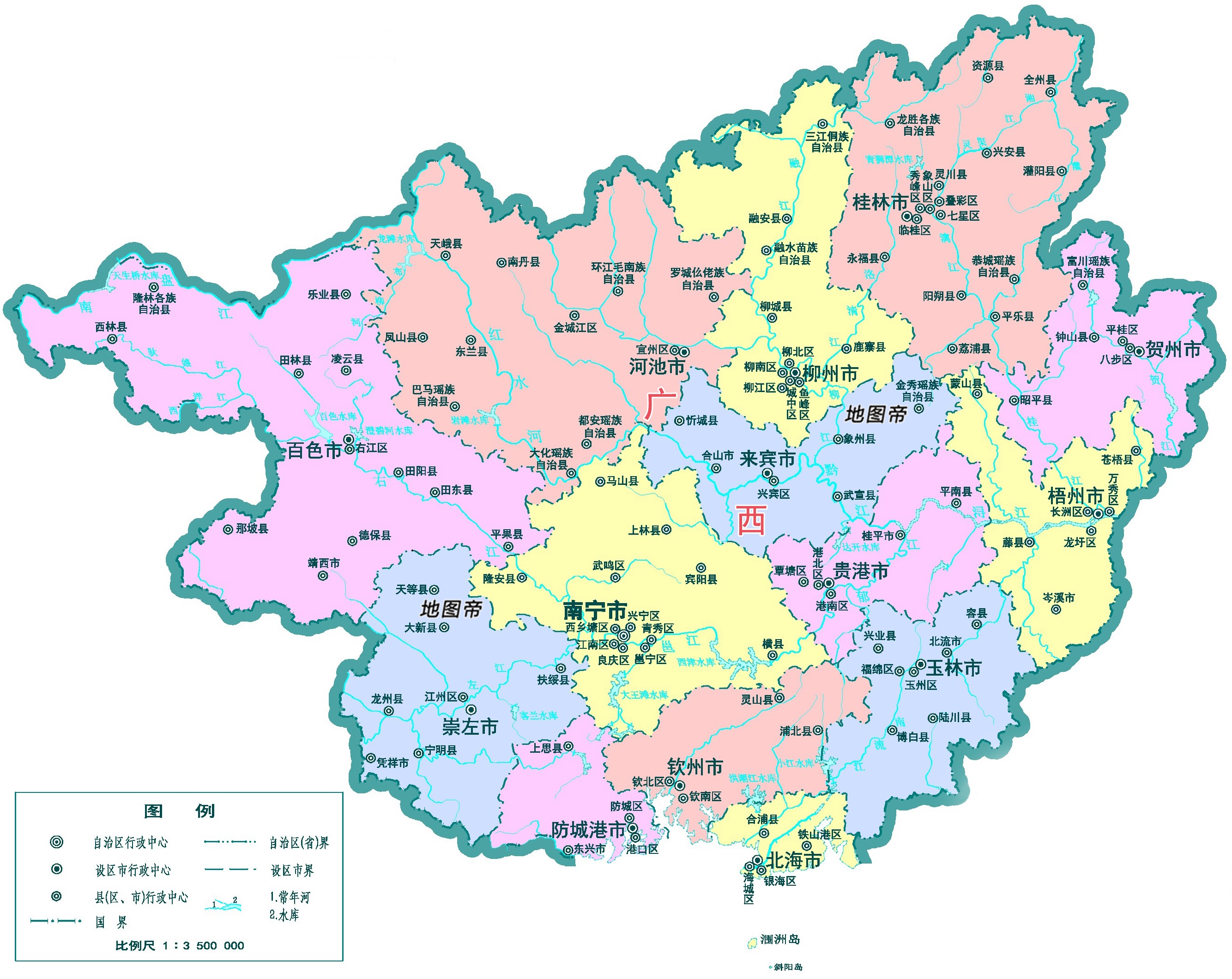Guangxi Zhuang Autonomous Region: Difference between revisions
More languages
More actions
(Created.) Tag: Visual edit |
(added website and date of establishment) Tag: Visual edit |
||
| (4 intermediate revisions by 4 users not shown) | |||
| Line 1: | Line 1: | ||
{{Infobox country| | {{Infobox country|name=Guangxi Zhuang Autonomous Region|native_name=广西壮族自治区<br>guǎng xī zhuàng zú zì zhì qū <br>Gvangjsih Bouxcuengh Swcigih|capital=[[Nanning]]|largest_city=[[Nanning]]|image_map=广西地图.jpg|official_languages=[[Chinese]] | ||
[[Zhuang]]|population_estimate=50,126,804|population_estimate_year=2020|official_website=http://en.gxzf.gov.cn/|area_km2=237,600}} | |||
'''Guangxi''' (Chinese: 广西; Zhuang: Gvangjsih), officially the '''Guangxi Zhuang Autonomous Region''', is an [[Autonomous regions of China|autonomous region]] in southern [[People's Republic of China|China]]. Unlike the autonomous regions of [[Tibet Autonomous Region| | '''Guangxi''' (Chinese: 广西; Zhuang: Gvangjsih), officially the '''Guangxi Zhuang Autonomous Region''', is an [[Autonomous regions of China|autonomous region]] in southern [[People's Republic of China|China]]. Unlike the autonomous regions of [[Tibet Autonomous Region|Tibet]] and [[Xinjiang Uygur Autonomous Region|Xinjiang]], it has not yet been targeted by Western secessionist movements. | ||
== History == | |||
In 221 BC, [[Qin Shi Huang]] [[Ying Zheng]] unified northern [[China]]. Thereafter he sent 500,000 troops to attack southern China. The aborigines in southern China had a low level of productivity and since then Guangxi Province became part of China. | |||
On March 5, 1958, the State Council established the Guangxi Zhuang Autonomous Region.<ref>{{Web citation|newspaper=People's Government of Guangxi Zhuang Autonomous Region|title=Overview|date=2024-02-04|url=http://en.gxzf.gov.cn/2024-02/04/c_263420.htm|retrieved=2024-05-21}}</ref> | |||
== Population == | |||
The [[Zhuang]] population in Guangxi accounts for 31.36% of the total population, with about 16 million Zhuang people. The Zhuang are the most numerous ethnic minority in China. | |||
== References == | == References == | ||
<references /> | |||
[[Category:Autonomous regions in China]] | [[Category:Autonomous regions in China]] | ||
[[Category:Provinces of China]] | |||
Latest revision as of 12:51, 21 May 2024
| Guangxi Zhuang Autonomous Region 广西壮族自治区 guǎng xī zhuàng zú zì zhì qū Gvangjsih Bouxcuengh Swcigih | |
|---|---|
 | |
| Capital and largest city | Nanning |
| Official languages | Chinese Zhuang |
| Area | |
• Total | 237,600 km² |
| Population | |
• 2020 estimate | 50,126,804 |
Website http://en.gxzf.gov.cn/ | |
Guangxi (Chinese: 广西; Zhuang: Gvangjsih), officially the Guangxi Zhuang Autonomous Region, is an autonomous region in southern China. Unlike the autonomous regions of Tibet and Xinjiang, it has not yet been targeted by Western secessionist movements.
History[edit | edit source]
In 221 BC, Qin Shi Huang Ying Zheng unified northern China. Thereafter he sent 500,000 troops to attack southern China. The aborigines in southern China had a low level of productivity and since then Guangxi Province became part of China.
On March 5, 1958, the State Council established the Guangxi Zhuang Autonomous Region.[1]
Population[edit | edit source]
The Zhuang population in Guangxi accounts for 31.36% of the total population, with about 16 million Zhuang people. The Zhuang are the most numerous ethnic minority in China.
References[edit | edit source]
- ↑ "Overview" (2024-02-04). People's Government of Guangxi Zhuang Autonomous Region. Retrieved 2024-05-21.
